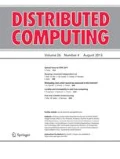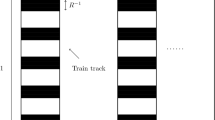Abstract
Suppose we are sending out k robots from 0 to search the real line at constant speed (with turns) to find a target at an unknown location; f of the robots are faulty, meaning that they fail to report the target although visiting its location (called crash type). The goal is to find the target in time at most \(\lambda |x|\), if the target is located at x, \(|x| \ge 1\), for \(\lambda \) as small as possible. We show that this cannot be achieved for
which is tight due to earlier work (see Czyzowitz et al. in Proc PODC’16, pp 405–414, 2016, where this problem was introduced). This also gives some better than previously known lower bounds for so-called Byzantine-type faulty robots that may actually wrongly report a target. In the second part of the paper we deal with the m-rays generalization of the problem, where the hidden target is to be detected on m rays all emanating at the same point. Using a generalization of our methods, along with a useful relaxation of the original problem, we establish a tight lower for this setting as well (as above, with \(\rho := \nicefrac {m(f+1)}{k}\)). When specialized to the case \(f=0\), this resolves the question on parallel search on m rays, posed by three groups of scientists some 15–30 years ago: by Baeza-Yates, Culberson, and Rawlins; by Kao, Ma, Sipser, and Yin; and by Bernstein, Finkelstein, and Zilberstein. The m-rays generalization is known to have connections to other, seemingly unrelated, problems, including hybrid algorithms for on-line problems, and so-called contract algorithms.
Similar content being viewed by others
Notes
We remark that induction is needed only for one part of the proof, which is given in Case 2 below.
References
Alon, N., Avin, C., Kouck, M., Kozma, G., Lotker, Z., Tuttle, M.R.: Many random walks are faster than one. Comb. Probab. Comput. 20(N4), 481–502 (2011)
Alpern, S., Gal, S.: The Theory of Search Games and Rendezvous, vol. 55. Springer, Berlin (2006)
Azar, Y., Broder, A.Z., Manasse, M.S.: On-line choice of on-line algorithms. In: Proceedings of the 4th Annual ACM-SIAM Symposium on Discrete Algorithms , pp. 432–440 (1993)
Baeza-Yates, R., Culberson, J., Rawlins, G.: Searching with uncertainty extended abstract. In: Karlsson, R., Lingas, A. (eds.) SWAT 88. LNCS, vol. 318, pp. 176–189. Springer, Berlin (1988)
Baeza-Yates, R., Culberson, J., Rawlins, G.: Searching in the plane. Inf. Comput. 106(2), 234–252 (1993)
Beck, A.: On the linear search problem. Israel J. Math. 2(N4), 221–228 (1964)
Beck, A.: More on the linear search problem. Israel J. Math. 3(N2), 61–70 (1965)
Beck, A., Newman, D.J.: Yet more on the linear search problem. Israel J. Math. 8(N4), 419–429 (1970)
Bellman, R.: Minimization problem. Bull. Am. Math. Soc. 62, 270 (1956)
Bellman, R.: An optimal search. SIAM Rev. 5(N3), 274 (1963)
Bernstein, D.S., Finkelstein, L., Zilberstein, S.: Contract algorithms and robots on rays: unifying two scheduling problems. IJCA I, 1211–1217 (2003)
Bose, P., De Carufel, J.-L., Durocher, S., Revisiting the problem of searching on a line. In: Algorithms—ESA. LNCS, vol. 8125, pp. 205–216. Springer (2013)
Czyzowitz, J., Georgiou, K., Kranakis, E., Krizanc, D., Narayanan, L., Opatrny, J., Shende, S.: Search on a line by Byzantine robots. In: Proceedings of the 27th International Symposium on Algorithms and Computation (ISAAC), pp. 27:1–27:12 (2016)
Czyzowitz, J., Kranakis, E., Krizanc, D., Narayanan, L., Opatrny, J.: Search on a line with faulty robots. In: Proceedings of the PODC’16, pp. 405–414 (2016)
Demaine, E.D., Fekete, S.P., Gal, S.: Online searching with turn cost. Theor. Comput. Sci. 361(N2), 342–355 (2006)
Feinerman, O., Korman, A., Lotker, Z., Sereni, J S.: Collaborative search on the plane without communication. In: Proceedings of the 2012 ACM symposium on Principles of distributed computing, ACM, pp. 77–86 (2012)
Fiat, A., Rabani, Y., Ravid, Y.: Competitive k-server algorithms. In: Proceedings of the 31st Annual IEEE Symposium on the Foundations of Computer Science, pp. 454–463 (1990)
Franck, W.: An optimal search problem. SIAM Rev. 7(N4), 503–512 (1965)
Isbell, J.R.: An optimal search pattern. Naval Res. Logist. Q. 4, 357–359 (1957)
Kao, M.Y., Ma, Y., Sipser, M., Yin, Y.: Optimal constructions of hybrid algorithms. J. Algorithms 29(N1), 142–164 (1998)
Kao, M.Y., Reif, J.H., Tate, S.R.: Searching in an unknown environment: an optimal randomized algorithm for the cow-path problem. Inf. Comput. 131(N1), 63–79 (1996)
Polycarpouy, M.M., Yang, Y., Passinoz, K.M.: A cooperative search framework for distributed agents. In: Intelligent Control, pp. 1–6 (2001)
Schuierer, S.: A lower bound for randomized searching on m rays. In: Computer Science in Perspective, pp. 264–277. LNCS, vol. 2598 (2003)
Acknowledgements
We thank Dániel Korándi, Alexander Pilz, Miloš Stojaković, and May Szedlak for discussions on and suggestions for the material covered in this paper, and Yoshio Okamoto for suggesting the problem.
Author information
Authors and Affiliations
Corresponding author
Additional information
Publisher's Note
Springer Nature remains neutral with regard to jurisdictional claims in published maps and institutional affiliations.
This research was initiated at the 15th Gremo’s Workshop on Open Problems (GWOP), Pochtenalp, Switzerland, June 12–16, 2017.
The research was partially supported by the Swiss National Science Foundation Grants Nos. 200020-162884 and 200021-175977 and by the EPSRC Grant No. EP/N019504/1.
Rights and permissions
About this article
Cite this article
Kupavskii, A., Welzl, E. Lower bounds for searching robots, some faulty. Distrib. Comput. 34, 229–237 (2021). https://doi.org/10.1007/s00446-019-00358-y
Received:
Accepted:
Published:
Issue Date:
DOI: https://doi.org/10.1007/s00446-019-00358-y




